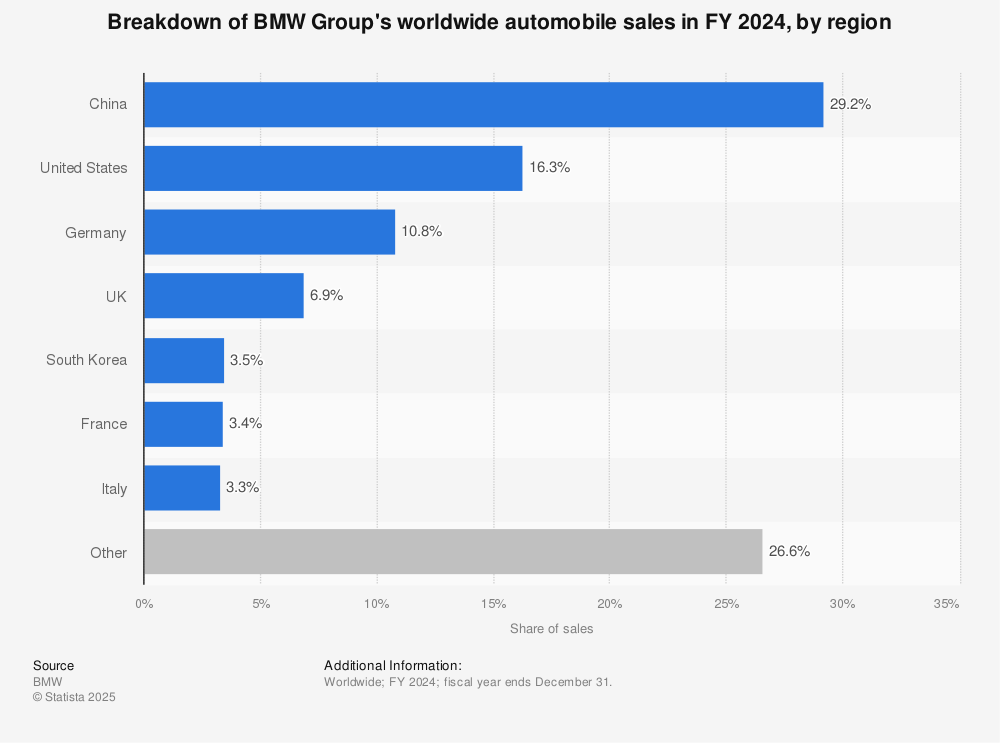Luxury Car Sales In China: Challenges For BMW, Porsche, And Competitors

Table of Contents
The Rise of Domestic Chinese Luxury Brands
The Chinese automotive industry is undergoing a dramatic transformation, with domestic brands rapidly gaining ground in the luxury segment. Companies like Hongqi, with its revival as a premium brand, and BYD's burgeoning luxury arm, are directly challenging established international players. These domestic brands are leveraging several key advantages:
- Competitive Pricing: Offering comparable features and quality at more competitive price points than established foreign brands.
- Targeted Models: Developing vehicles specifically designed to appeal to the preferences and tastes of Chinese consumers. For example, Hongqi's flagship models are often larger and more opulent than their Western counterparts.
- Technological Advancements: Integrating cutting-edge technologies, such as advanced driver-assistance systems (ADAS) and electric powertrains, often surpassing the offerings of some international competitors. BYD's electric vehicle technology is a prime example.
This rise of Chinese luxury cars presents a significant challenge to BMW, Porsche, and other international brands accustomed to dominating the market. The increasing competition in the Chinese luxury market demands a reassessment of traditional strategies.
Shifting Consumer Preferences in China
Chinese luxury car buyers are evolving, demanding more than just a prestigious badge. Their preferences are driving significant changes in the market:
- Electric Vehicles (EVs): There is a strong and growing preference for electric vehicles, particularly among younger, tech-savvy consumers. This necessitates investment in EV technology and infrastructure.
- Digital Marketing & Online Sales: Chinese consumers are highly digitally engaged. Effective digital marketing strategies and robust online sales channels are crucial for reaching and converting customers.
- Personalized Experiences: Luxury car buyers in China expect personalized service and experiences tailored to their individual needs and preferences.
- Advanced Technology & Connectivity: Features like advanced driver-assistance systems (ADAS), sophisticated infotainment systems, and seamless connectivity are highly valued. Social media and online reviews significantly influence purchasing decisions, highlighting the need for strong brand reputation management.
Understanding these evolving Chinese consumer preferences is paramount for success in the luxury car market.
Navigating China's Regulatory Landscape
The Chinese automotive market is subject to a complex and ever-changing regulatory landscape. International brands must navigate several key challenges:
- Import Tariffs: High import tariffs can significantly impact pricing and profitability.
- Environmental Regulations: Stringent emission standards require significant investment in cleaner technologies and compliance measures. Meeting these Chinese automotive market regulations is crucial.
- Local Content Requirements: Regulations often mandate a certain percentage of locally sourced components, impacting supply chains and production strategies.
Effectively navigating these China automotive regulations is crucial for long-term success. Understanding and proactively addressing these complexities is critical for profitability and market share.
Supply Chain Disruptions and Economic Factors
Global supply chain disruptions and economic uncertainties significantly impact luxury car sales in China:
- Chip Shortages & Material Constraints: The global chip shortage and other material constraints have hampered production and delivery timelines, impacting sales and customer satisfaction.
- Economic Downturns: Economic slowdowns or uncertainties can lead to decreased consumer spending, particularly in the luxury segment.
- Adapting Strategies: Luxury car brands are adapting by diversifying sourcing, optimizing production processes, and strengthening supply chain resilience.
Successfully navigating these challenges requires flexible strategies, robust risk management, and a proactive approach to mitigating supply chain disruptions.
The Future of Luxury Car Sales in China
The future of luxury car sales in China is dynamic and presents both significant opportunities and challenges. Brands like BMW and Porsche, while facing increasing competition from domestic players and shifting consumer preferences, still hold considerable market potential. Success will depend on understanding and adapting to the evolving dynamics of the market, including navigating regulatory hurdles, and responding effectively to economic uncertainties. The ability to cater to the unique preferences of Chinese luxury car buyers, particularly their embrace of technology and personalization, will be paramount. To learn more about the strategies employed by successful players in this competitive market, explore additional resources and industry analysis dedicated to luxury car sales in China. The continued evolution of this market offers invaluable insights for understanding global luxury automotive trends.

Featured Posts
-
 World Reacts To Death Of Pope Francis At Age 88
Apr 22, 2025
World Reacts To Death Of Pope Francis At Age 88
Apr 22, 2025 -
 Chinas Export Dependence Vulnerability To Rising Tariffs
Apr 22, 2025
Chinas Export Dependence Vulnerability To Rising Tariffs
Apr 22, 2025 -
 January 6th Hearing Witness Cassidy Hutchinson To Publish Memoir This Fall
Apr 22, 2025
January 6th Hearing Witness Cassidy Hutchinson To Publish Memoir This Fall
Apr 22, 2025 -
 Ftc Probe Into Open Ai Examining Chat Gpts Data Practices And Privacy
Apr 22, 2025
Ftc Probe Into Open Ai Examining Chat Gpts Data Practices And Privacy
Apr 22, 2025 -
 Razer Blade 16 2025 Review High End Gaming On An Ultra Thin Design
Apr 22, 2025
Razer Blade 16 2025 Review High End Gaming On An Ultra Thin Design
Apr 22, 2025
